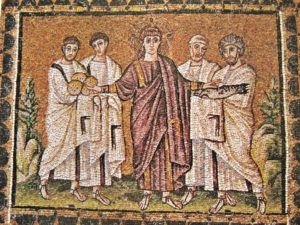Thoughts on Sunday’s Lessons for July 29, 2018

The Miracle of the Loaves and Fishes (6th century). Mosaic in the Basilica di Sant’ Apollinare Nuovo, Ravenna, Italy. (Click image to enlarge.)
First Reading (Track One): 2 Samuel 11:1-15
Power corrupts. We see this simple wisdom amply demonstrated in the life of David. For all the reverence that David earned through his kingship and warrior victories, when he was bad, he was very, very bad. We see this in Sunday’s horrifying Track One first reading: He is so attracted by the sight of beautiful Bathsheba bathing on her roof that he summons her, rapes her – no kinder term will serve for a person in his power taking her without her consent – and then arranges for the death of her husband, Uriah, in battle.
First Reading (Track Two): 2 Kings 4:42-44
Just about everyone enjoys hearing about the time Jesus fed a crowd with loaves and fishes that mysteriously multiply to more than fulfill the need. This is surely one of the most familiar Gospel stories. In fact, it is Jesus’ only miracle that is told in all four Gospels. You may not be so quick to remember the similar story of the Prophet Elisha feeding a crowd, though! Faced with a crowd of hungry people, Elisha directed that they be fed from a sack of food that a man had brought to sacrifice. He had only 20 loaves and a bit of grain for 100 people, which didn’t seem like much, but it proved to be more than enough. Just as in the Gospel stories, there were even leftovers.
Psalm (Track One): Psalm 14
Another of the many Psalms that tradition attributes to David himself, this one resonates with David’s heinous behavior in the first reading. Here the Psalmist, imagined as a disappointed king, laments that the people have turned faithless and corrupt, foolishly denying God as they commit abominable acts. God looks down to see if any wise people remain, but there are none. But even in these times of evil, God remains with the righteous; God is the refuge of the just, and eventually will deliver the people and restore their fortunes.
Psalm (Track Two): Psalm 145:10-19
Reflecting the bounty that God provided for the hungry people in Ezekiel and that Jesus fed the hungry crowd on the mountainside, this Psalm of worship, praise and thanksgiving celebrates God who feeds us, whose outstretched hands satisfy every living creature. We sing of a God who is not only powerful but faithful and merciful as well. Our God will always gently lift up those who fall and support those who are oppressed.
Second Reading: Ephesians 3:14-21
Sunday’s passage from the letter to the Ephesians takes a break from its pastoral advice as the author kneels before God to lift up a prayer for the people being addressed. He prays that the people of Ephesus may receive strength through the Holy Spirit, and that Christ may come to live in their hearts through faith. The reading closes with a beautiful blessing that we often hear slightly reworded as a benediction in Morning and Evening Prayer: “Glory to God whose power, working in us, can do infinitely more than we can ask or imagine.”
Gospel: John 6:1-21
Starting Sunday and continuing through the month of August, our gospel readings will turn from our year with Mark to visit the sixth chapter of John, in which Jesus discourses at length about the bread of life. We begin with John’s version of the familiar story of the loaves and the fishes. John more directly hints at the Eucharist than do the other evangelists: Jesus takes the bread, blesses it by giving thanks, then distributes five barley loaves and two fish to 5,000 people. The blessed repast somehow fills everyone abundantly, and more is left over than they started with! The crowds are so amazed that they clamor to make Jesus king by force; but he slips away, terrifying the disciples by walking miles across the water to catch up with their boat.
What are “Track 1” and “Track 2”?
During the long green season after Pentecost, there are two tracks (or strands) each week for Old Testament readings. Within each track, there is a Psalm chosen to accompany the particular lesson.
The Revised Common Lectionary allows us to make use of either of these tracks, but once a track has been selected, it should be followed through to the end of the Pentecost season, rather than jumping back and forth between the two strands.
For more information from LectionaryPage.net, click here.
